Pakistan Rangers
| Pakistan Rangers | |
|---|---|
| Founded | 14 August 1947 |
| Country | Pakistan |
| Type | Paramilitary |
| Size | 25,000 active troops (2017)[1] |
| Part of | Paramilitary forces of Pakistan |
| Headquarters | Islamabad, Karachi and Lahore |
| Motto(s) | Daim's Sahir'n "Ever Ready" |
| Colour |
red and blue |
| Commanders | |
| Director General, Punjab | Major-General Saqib Mehmood Malik, |
| Director General, Sindh | Major-General Muhammad Saeed |

The Pakistan Rangers (Urdu: پاکستان رےنجرز) are a paramilitary law enforcement organization in Pakistan and have a primary mission of securing important sites such as Pakistan's International Border with India as well as employed in internal security operations, and providing assistance to the police in maintaining law and order.
Rangers is an umbrella term for the Pakistan Rangers -Punjab, headquartered in Lahore, responsible for guarding Punjab Province's 1,300 km long IB with India, and the Pakistan Rangers -Sindh, headquartered in Karachi, defending Sindh Province's ~912 km long IB with India. The forces operate under their own separate chains of command and wear distinct uniforms.
Most famously each evening, the Pakistan Rangers- Punjab together with their Indian counterparts in the Border Security Force, participate in an elaborate flag lowering ceremony at Wagah border crossing near Lahore.
The mutually-recognised International Border is different from the disputed Line of Control (LoC) where Pakistan's Punjab Province adjoins Kashmir; as a result the LoC is not managed by the paramilitary Punjab Rangers, but by the regular Pakistan Army.
Rangers are formally supervised by Special Security Unit, National Crises Management Cell, in the federal Ministry of Interior, but are commanded by officers on secondment from the Pakistan Army. As of 2017, per IISS, it had 25,000 active personnel.[2] As part of the Civil Armed Forces the Rangers can come under the operational control of army corps headquarters, not just in war time, but whenever Article 245 of the Pakistani Constitution is invoked to provide 'military aid to civil power', for example in Karachi since 2015, and in Punjab since February 2017.
The Force is governed by Rangers Ordinance 1959.
History

The origins and roots of Rangers dates back to 1942, when the British government established a special unit as the Sindh Police Rangers.
After the independence of Pakistan in 1947, the protection of its eastern boundaries was allotted to particular forces, such as the Punjab Border Police Force, Bahawalpur State Police, Khairpur State Police and Sindh Rifles.
Because the Rangers were neither correctly structured nor outfitted for a specific duty, in 1958, they were restructured and renamed as the West Pakistan Rangers. In 1972 following the Legal Framework Order No. 1970, the force was renamed from the West Pakistan Rangers to Pakistan Rangers and given under the control of Federal Government (Ministry of Defence).
In 1974, it became part of the Civil Armed Forces under the Ministry of Interior, where they have remained since.
In late 1989, due to growing riots and worsening Law and Order situation in Sindh, a new force was raised for a strategic anti-dacoit operation in the interior of Sindh. The force operated under the name of Mehran Force and included the then existing Sindh Rangers, 3 Battalions of Pakistan Army (inc. SSG), Northern Scouts. Mehran force was under the direct command of Director General Pakistan Rangers with its nucleus Headquarters in Karachi.
Subsequently, the Federal Government decided to substantially increase the strength of Rangers and the raising of separate Headquarters for Pakistan Rangers in Sindh. Consequently, 1 July 1995 the Pakistan Rangers were bifurcated into two separate forces, the Pakistan Rangers (Punjab) and Pakistan Rangers (Sindh). The Mehran Force and other paramilitary units operating in the province of Sindh were merged into the Pakistan Rangers (Sindh).[3]
War performances

The Rangers had fought together with the Pakistan Army in several conflicts, namely the 1965 Indo-Pak war and 1971 Indo-Pakistan War.[4] After the 1971 war, the force was federalized underneath the Ministry of Defence as the Pakistan Rangers, and, shortly in 1974, it was made a component of the Civil Armed Forces (CAF) under the Ministry of Interior. Pakistan Rangers guard the borders during peace and war. In 1995, the Mehran Force was merged into the Pakistan Rangers (Sindh). The Pakistan Rangers (Sindh) are credited for providing the Pakistan Army troops for Special Police Units in Kosovo and Haiti Peace mission.[3]
These troops are entrusted with the task to provide protection and security to UN officials, provide operational and backup support, respond to threats to public order in co-ordination with the Kosovo administration, and assist humanitarian agencies.[5] The Rangers also had participated in numerous special military operations along with Pakistan Army Special Forces branch in the past. Since their revitalisation and re-building after the 1971 war, the Rangers have been involved in the numerous special military operations in Pakistan. The Rangers have also assisted the Army's Special Service Group in performing special operations. They first participated in 1973, when they, based on the intelligence reports, had successfully accompanied the SSGs to raid the Iraqi Embassy. In 1992, the Rangers were deployed to Karachi, and the Government of Sindh had used Rangers to keep peace in the city. The Rangers had also participated in Operation Blue Fox in 1992 along with the Army. Due to their close association with the Army, the Rangers also fought in Indo-Pakistani War of 1999 (best known as Kargil War) deployed in Jammu and Kashmir. Despite the fact of it being a paramilitary force, the Government of Pakistan had recognised the Rangers as its one its special forces in 2004. The Rangers were among one of the special forces that participated in Operation Silence and accompanied Army Commandos in the operation. During the operation, the Rangers suffered a single casualty.[6] In 2009, Rangers completed a special military operation in Lahore alongside the Special Service Group, when terrorists attacked the Manawan Police Academy. While it was led by the Pakistan Rangers, the operation, codenamed Lahore Police Academy Operation, ended with eight militant deaths with one captured.[7] The same year, the Government of Pakistan deployed the Rangers to secure the outskirts of Islamabad when Taliban forces had taken over the Buner, Lower Dir, Swat and Shangla districts. Its members also participated in Operation Black Thunderstorm while securing the capital.[8]
Leadership
Pakistan Rangers is a paramilitary Border Security Force which comes under control of Federal Interior Ministry for Internal Security duties and work under umbrella of Corps V in Sindh and IV Corps in Punjab for duties in war zones and borders. Pakistan Rangers are divided into two separate branches: Pakistan Rangers (Sindh) and Pakistan Rangers (Punjab). Each branch is headed by a Director General appointed by the Pakistan Army after the clearance from the Chief of Army Staff. The Director General of the Pakistan Rangers currently holds the 2-star rank of Major-General. The current Director General of Pakistan Rangers (Sindh) is Major General Muhammad Saeed,[9] whereas Director General of Pakistan Rangers (Punjab) is Major General Azhar Naveed Hayat Khan.[10]
The equivalent paramilitary force in Balochistan and Khyber Pakhtunkhwa is called the Frontier Corps (FC), each province with its own FC unit.
Role

One prime objective of the Rangers is to safeguard the eastern borders of Pakistan with India which with the Sindh province, shares approximately 912 kilometres and in the Punjab Province approximately shares 1200 kilometres. The Rangers are also responsible for maintaining internal security in Pakistan and a major law enforcement organisation in the country. Despite this, they are not privileged with the power to arrest like the police except in desperate but rare time eras, when the state temporarily sanctions them with such a power. Their primary objective as an internal security force is to prevent crime by taking preventive security measures, disable organised criminals and thwart organised crime. All suspects apprehended by Rangers are later handed over to police for further investigation and possible prosecution except for the rare instances when Rangers are legally empowered by the state to arrest and detain suspects. The same privileges are also temporarily granted by the government to other security organisations such as the Frontier Corps for the same reasons.
The Rangers are also tasked with securing important monuments and guarding national assets in all major cities of Pakistan, including Islamabad.
In the past, they have also served as prison guards for high-profile terrorists until they were withdrawn from such duties.[11]
The Rangers have notably contributed towards maintaining law and order in Islamabad, Karachi, and Lahore in major crises. The Sindh Rangers consist of approximately 25,000 persons whereas almost half of the total force is deployed to Karachi. Due to the unstable situation in Pakistan, the Rangers have become extremely necessary to maintain law and order in all major cities.
Organization
Like the police of Pakistan, the Rangers collectively function as provincial organisations independent of one another: The Pakistan Rangers Sindh of the province of Sindh and the Pakistan Rangers Punjab belonging to the province of Punjab.
Sindh Rangers
The Sindh Rangers consists of around 25,000 Rangers manning 29 Wings of 730 Rangers each[12].
The Sindh Rangers are divided into seven Sectors; Indus, Thar, Shahbaz, Bhittai, Qasim, Sachal, and Abdullah Shah Ghazi. Each Sector has four battalion sized wings[13].
Sindh Rangers requested Supreme Court of Pakistan to allow paramilitary force to establish its own stations.[14]
In addition to its border security duties (912km Sindh border with India) the Sindh Rangers patrols and protects the Indus river area, Pakistan's national highways, Katcha area and hill areas where regular police forces cannot operate properly[15].
Punjab Rangers
In addition to its primary mission protect the 1200km border with India, the Punjab Rangers are also employed on internal security duties in Gilgit, Islamabad Capital Territory, Tarbela, Rajanpur and Kashmore[16]
Rangers Anti-Terrorist Squad (RATS)
The Rangers Anti-Terrorist wing has been active since early 2004. It is similar to the Pakistani Army SSG. They are trained by Zarrar Company of Special Services Group (SSG) of the Pakistani Army.
Training and selection
The selection for rangers lasts 2–3 weeks. Both male and females can join the Rangers and an applicant must be between 18–25 years old for Punjab Rangers and 18 to 30 years old for Sindh Rangers. To apply for the Rangers, the applicant must passed F.A or F.Sc. (an equivalent to US matriculation system) from a government-registered college. An applicant must hold Pakistani citizenship to join the force. The Rangers can be deployed at any place either in Pakistan or abroad, according to the Rangers Act of 1959.[17]
In spite of its role as paramilitary, the Rangers have been recognised by Government of Pakistan as one of its special forces.
Appointments
Although the Pakistan Rangers are under the administration of the Interior ministry, key positions in the force, including Director-General of the Rangers, are headed by the members of the Pakistan Army. The Director General of the Pakistan Rangers is appointed by Pakistan Army's General Headquarters (GHQ). Director General is a two star general rank equivalent to Major General. The majority of the officers come from Pakistan Army, however many departmental officers of the rangers are inducted as direct entry Sub Inspectors. These officers can reach a maximum rank of SSR (Senior Superintendent Rangers) equal to Lieutenant Colonel in the Pakistan Army.
OR, NCO, JCO ranks:
- Other Ranks
- NCO Ranks
- JCO Ranks
- Sub Inspector (equal to Naib Subedar)
- Inspector (equal to Subedar)
- Senior Inspector (equal to Subedar Major)
Officer ranks:
- Direct Entry Sub Inspector (equal to Naib Subedar, but with the responsibilities of a 2nd Lieutenant)
- Inspector (equal to Subedar, but with the responsibilities of a Lieutenant)
- DSR (Deputy Superintendent of Rangers) (equal to Captain)
- SR (Superintendent of Rangers) (equal to Major)
- SSR (Senior Superintendent of Rangers) (equal to Lieutenant Colonel)
Personnel joining as Sepoys can reach a maximum rank of Deputy Superintendent of Rangers, similar to Honorary Captain in the Army.
The rank insignia are the same as those used by the Pakistan Army, except for Inspector ranks which use the standard police rank insignia.
Flag lowering ceremony
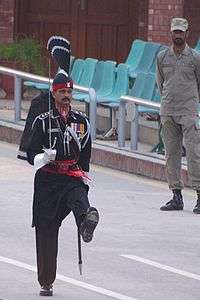
Wagah, the only road border crossing between Pakistan and India, is the site of a flag lowering ceremony each evening. During the ceremony, Pakistani Rangers and their counterparts in the Indian Border Security Force carry out a drill in which they mirror each other's drill with high kicking steps, foot stamping and aggressive stares. Despite the outward display of aggression, the drill of both sides actually requires a high degree of co-operation.
The ceremony is attended by numerous spectators from both nations, as well as foreign tourists.
Standard equipment
- Automatic Rifles – 7.62 mm Heckler & Koch/POF G3, 7.62 mm Type 56 (POF made) and 5.56 mm Steyr AUG
- Sub-Machine Guns – 9 mm Heckler & Koch/POF MP5 and 9 mm SMG-PK (POF made)
- Pistols – Glock series & Sigma series
- Sniper Rifles – Heckler & Koch/POF PSR-90 (POF made), Dragunov
- Hand Grenades – ARGES 84 (POF made)
- Anti-tank Weapons – RPG-7 (POF made), RPG-29 (Rocket Launchers), M40A1 (Recoilless Rifle)
- Machine Gun – 7.62 mm Rheinmetall/POF MG3 (POF made)
- Heavy Machine Gun – 12.7mm Type 54 (POF made)
- Mortars – Various locally produced in use
- Bullet Proof Jackets – Various local and foreign types
- Helmets – Modular Integrated Communications Helmet and indigenous helmets locally produced
- NVG goggles
- Utility Vehicles – APC Talha/Saad, Mohafiz (HIT made), Indus Hilux locally produced
- Helicopters – Bell 206 LongRanger, Bell 412
The formal headwear of the Rangers are somewhat similar to the ones worn by the Frontier Corps.
Notable officers
- Sub-Inspector Amarjeet Singh- The first Sikh Pakistani Officer of the Pakistan Rangers (Punjab).[18]
- SSR Malik Mukhtar- is the first officer of Pakistan Rangers who reach to rank of Senior Superintendent of Rangers which is equal to Army Lt Col rank and he is doing duty as Wing Commander apart from this he is also known by his bravery specially in Karachi operation 1992
BG Shaukat Ali Raja was in command in a post where a LG usually is in charge. As a result, MG would have to salute his motorcade. The only BG to ever be in command to date of the Punjab Rangers located in Lahore.
Role of peace maintenance in Karachi
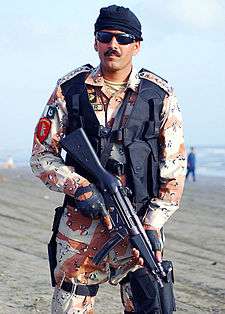
While kidnapping for ransom, extortion, threats to the business community were common in Karachi and industrialists were shifting their investment in Bangladesh and other countries, Chief of Army Staff, Gen Ashfaq Pervaiz Kiyani took the notice of dire situation and on request of government and business community, the Rangers were deployed with special powers.[19] The Rangers played a crucial role in maintaining peace and curbed law offenders without any discrimination and consideration of political affiliation. Business community in particular and masses in general took sight of relief and lauded the role of rangers in Sindh. Director General Rangers Sindh Lt.General Ejaz Chaudry visited Karachi Chamber of Commerce and Industry on 17 November 2011, on this occasion business community unanimously acclaimed the rangers role in maintaining peace in the city and demanded extension in its stay with special orders for another one year.[20]
US General Vincent R. Stewart praised the anti-insurgency operations in the western areas of Pakistan by the Pakistan military. He also praised the Karachi operations by the Rangers, arguing they all helped reduce violence in the country.[21]
Foreign peacekeeping missions for the United Nations
The Pakistan Rangers have also been involved in international peacekeeping operations for the United Nations (UN) in a number of countries such as Kosovo, Haiti and others.[22][23]
Notable operations, incidents and controversies
- In 1973 the Punjab Rangers and Islamabad Police raided the Iraqi embassy in Islamabad after a discovery of illegal arms stored there.
- More recently in 2011 the Punjab Rangers participated in the Lal Masjid Operation or Operation Silence.
- Also in 2011 the Sindh Rangers were involved in a controversial shooting of an unarmed civilian which was caught on camera, broadcast by news networks throughout the country and sparked public outcry. All Rangers involved were prosecuted and the one who directly fired the shots was sentenced to death.[24][25]
- In 2015 the Sindh Rangers in a controversial move raided the office of the Muttahida Qaumi Movement (previously Muhajir Qaumi Movement) in Karachi and detained members of the MQM party. Also caught in the raids were illegal guns and ammunition.[26][27]
- In January 2016, two employees of Pakistan International Airlines were feared dead during a public protest which blocked a road near Karachi airport and which Rangers were assigned to clear from protesters which is suspected in resulting these two deaths.[28]
Public communication
Pakistan Rangers Sindh is starting its own radio show in Karachi known as "Rangers Hour" on FM 101 intended to communicate with the people of the metropolis; earlier to this such radio service was also established by Sindh Police on FM88.6. Before this Sindh Rangers also established a 24hours helpline 1101 for the people to report any crime information in the metropolis.[29]
Gallery
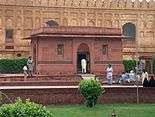
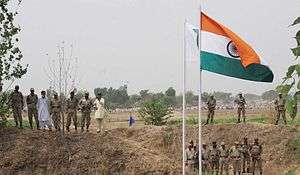 Baba Chamliyal Mela at Indo-Pak international Border, near Jammu
Baba Chamliyal Mela at Indo-Pak international Border, near Jammu- Border personnel from both countries, during the Wagah Border ceremony.
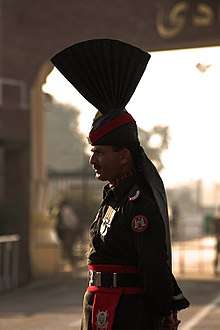 Pakistani Ranger
Pakistani Ranger Pakistani Ranger holding a Walkie-talkie
Pakistani Ranger holding a Walkie-talkie Wagah border ceremony
Wagah border ceremony Pakistani border rangers at Wagah border near Lahore
Pakistani border rangers at Wagah border near Lahore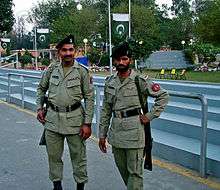 Pakistan Rangers (Punjab) at the Wagah border armed with G3 assault rifles
Pakistan Rangers (Punjab) at the Wagah border armed with G3 assault rifles
See also
References
- ↑ (Iiss), International Institute for Strategic Studies (2017-02-14). The Military Balance 2017. ISBN 9781857439007.
- ↑ (Iiss), The International Institute of Strategic Studies (2017-02-14). The Military Balance 2017. Routledge, Chapman & Hall, Incorporated. ISBN 9781857439007.
- 1 2 Jovana Ljubic (ed.). "Pakistan Rangers" (PDF). Igor Pejek, University of Belgrade. Sterlok Anylisis.
- ↑ Pakistan Army. "Pakistan Army Rangers (Punjab)". Pakistan Army Press Publications. ISPR.
- ↑ Pakistan Rangers (Sindh). "United Nations Peace Mission". Pakistan Army. Inter Services Public Relations (ISPR).
- ↑ Lal Masjid. "102 killed in Lal Masjid operation, Sherpao". Geo Tv. Archived from the original on 25 December 2014.
- ↑ "How Pakistan academy attack started". BBC News. 30 March 2009.
- ↑ Bill Roggio (24 April 2009). "Rangers deployed to secure Islamabad outskirts". The Long War Journal. Retrieved 9 January 2011.
- ↑ "Pakistan Rangers (Sindh) : Official Web Portal". Retrieved 2 February 2015.
- ↑ Dawn news 19 March 2015
- ↑ "Punjab withdraws Rangers from guard duties". Mohammed Asghar. Dawn News.
- ↑ http://pakistanrangerssindh.org/org.php
- ↑ http://pakistanrangerssindh.org/images/org1.gif
- ↑ "Sindh Rangers want to set up its own 'police stations' in Karachi". The Express Tribune. Retrieved 13 July 2016.
- ↑ strelok-analysis.com/wp-content/uploads/2017/01/Pakistans-Rengers.pdf
- ↑ strelok-analysis.com/wp-content/uploads/2017/01/Pakistans-Rengers.pdf.
- ↑ "Pakistan Jobs – Pakistan New Job Vacancies". Retrieved 2 February 2015.
- ↑ "First Sikh youth completes training as Pakistan Rangers officer. – Free Online Library". Thefreelibrary.com. 21 October 2009. Retrieved 9 January 2011.
- ↑ "Dunya News: Pakistan:- Rangers get special powers in Karachi …". Retrieved 2 February 2015.
- ↑ "Nisar lauds Sindh Rangers' role in Karachi operation". The Nation. Retrieved 2 February 2015.
- ↑ "Pakistan Military operations helped reduce violence in Pakistan: US defence intel chief". The Express Tribune.
- ↑ "Welcome to Pakistan Rangers (Punjab)". Retrieved 2 February 2015.
- ↑ "Pakistan Rangers on UN peacekeeping mission". The News International, Pakistan. 29 February 2008. Retrieved 2 February 2015.
- ↑ Nelson, Dean (10 June 2011). "Pakistani soldiers arrested after TV footage shows them shooting unarmed man". The Daily Telegraph. London.
- ↑ AFP. "One Rangers personnel sentenced to death for Sarfaraz killing". Retrieved 2 February 2015.
- ↑ "Rangers raid MQM HQ in Karachi, detain member of Rabita Committee".
- ↑ "One dead, several injured as Rangers raid MQM headquarters". The Express Tribune. 11 March 2015.
- ↑ Boone, Jon (2 February 2016). "Pakistan's state airline suspends flights after workers die in protest" – via The Guardian.
- ↑ "The new voice on Radio: Rangers". The Express Tribune. Retrieved 13 July 2016.